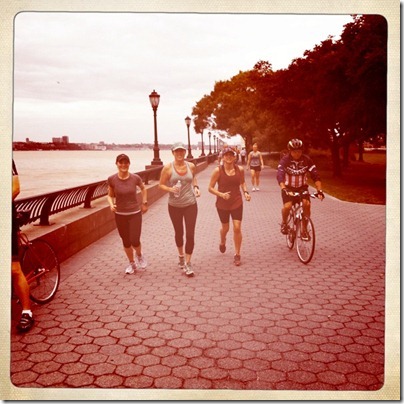Hello all!
Ashley, thank you for the opportunity to participate in this series.
 Marathon training is a unique adventure and an emotional roller coaster. As a running coach with Hot Bird Running, in Brooklyn, NY, several of our runners are in the middle of one the hardest emotional phases of training – the end of their highest mileage long run and then a transition into tapering for the 2011 NYC Marathon on November 6th. I hear a lot of mixed emotions: the onset of race day excitement; discouraged sentiments and struggling to find motivation and sense of purpose in their training; or concern for existing injuries and anxiety about getting through their longest run this weekend. After completing three marathons and currently in the middle of training for my fourth, I am very familiar with the significant role these and other emotions have on training success and the ability to maintain balance in the rest of one’s life at the same time. To ensure a sound emotional approach and positive response to the marathon experience, I recommend that anyone training for a marathon considering the following:
Marathon training is a unique adventure and an emotional roller coaster. As a running coach with Hot Bird Running, in Brooklyn, NY, several of our runners are in the middle of one the hardest emotional phases of training – the end of their highest mileage long run and then a transition into tapering for the 2011 NYC Marathon on November 6th. I hear a lot of mixed emotions: the onset of race day excitement; discouraged sentiments and struggling to find motivation and sense of purpose in their training; or concern for existing injuries and anxiety about getting through their longest run this weekend. After completing three marathons and currently in the middle of training for my fourth, I am very familiar with the significant role these and other emotions have on training success and the ability to maintain balance in the rest of one’s life at the same time. To ensure a sound emotional approach and positive response to the marathon experience, I recommend that anyone training for a marathon considering the following:
Travel to train. Break out of autopilot in your training runs by changing your scenery. I always get in at least couple runs a month outside of my city, preferably at least one long one. If most of long runs are in the city, seek out a trail run instead – it will feel completely different. Don’t be afraid to get in your car and drive somewhere for a run. This includes a quick day trip outside of your hometown, running on vacation or out of town for work. Changing your running venue keeps your training interesting and challenging. My best long training runs the last two marathons were trail runs in Portland, Oregon while visiting family. The winding trails, delicious smell of the forest and varied terrain were just what I needed to kick it up a notch.
 Don’t try this alone. In my experience, marathon training is not complete without a social component. First, it’s important to connect and share the joys and tribulations of training with other runners who understand what you’re going through. Additionally, marathon training is emotionally draining and without moral support, you may lose out on half of the training experience or find it hard to motivate/enjoy running as much. Moreover, running with people encourages you to run further, faster and along new routes. An option for groups of varying paces is to map out a run in advance and begin and end together to create a shared experience even if running in front or in back of each other. Finally, running with people introduces the fun element into your training, and that’s the whole point, right?
Don’t try this alone. In my experience, marathon training is not complete without a social component. First, it’s important to connect and share the joys and tribulations of training with other runners who understand what you’re going through. Additionally, marathon training is emotionally draining and without moral support, you may lose out on half of the training experience or find it hard to motivate/enjoy running as much. Moreover, running with people encourages you to run further, faster and along new routes. An option for groups of varying paces is to map out a run in advance and begin and end together to create a shared experience even if running in front or in back of each other. Finally, running with people introduces the fun element into your training, and that’s the whole point, right?
 Use marathon training as cross training for another sport. I am a runner because I am an athlete. I love running as a way to get in shape for my other passions such as skiing and hiking. During cold, wet winter training runs for the Boston Marathon held in April, reaping the benefits of increased stamina and strength on the ski slopes throughout the winter provided all the motivation I needed to get me through my training runs. Running doesn’t have to just be about the race. Occasionally switching the focus of your workouts to something other than a race that is 2 months away provides a nice mental break and prevents training burn out.
Use marathon training as cross training for another sport. I am a runner because I am an athlete. I love running as a way to get in shape for my other passions such as skiing and hiking. During cold, wet winter training runs for the Boston Marathon held in April, reaping the benefits of increased stamina and strength on the ski slopes throughout the winter provided all the motivation I needed to get me through my training runs. Running doesn’t have to just be about the race. Occasionally switching the focus of your workouts to something other than a race that is 2 months away provides a nice mental break and prevents training burn out.
 Flaunt your enhanced physical fitness. I love that my golf game is always a little better in the middle of marathon training – longer drives and improved mental focus and a more controlled short game. Or the awesomeness of being able to run around like crazy during the 90-minute full field soccer game at a wedding weekend in Oregon while training for the Richmond Marathon last fall.
Flaunt your enhanced physical fitness. I love that my golf game is always a little better in the middle of marathon training – longer drives and improved mental focus and a more controlled short game. Or the awesomeness of being able to run around like crazy during the 90-minute full field soccer game at a wedding weekend in Oregon while training for the Richmond Marathon last fall.
Injuries offer new beginnings. If an injury requires a week or more off from running, don’t panic. Stay in the game! This does not mean you cannot run the marathon. It is not unusual for runners to have to take a week off from running around the transition into taper as a safe way to avoid injury before the race. If possible, maintain endurance by biking or swimming or aqua jogging during your period of rest. If you’re able to continue exercising while trying to recovery in time for a race, focus on enjoying the new form of activity rather than stressing out about your injury. You never know what an injury might inspire. Last week I took up mountain biking for the first team during a week in California because of an Achilles injury caused by a chair smashing into my leg and forcing me to stop training for the 2011 NYC marathon. Not much of a biker and excited to spend all week running trails in Marin County, it a few days took a few days for me to accept my current situation (and for my butt to stop hurting from the bike seat). By the end of the week I was excited to replace my 20-mile long run with a 3-hour climb to the top of Mount Tamalpais on my mountain bike and look forward to future biking adventures that I would not have considered before this experience.
 So much of marathon training is out of your control and the best way to find moderation in your training is to develop an emotional strategy for coping with curveballs
So much of marathon training is out of your control and the best way to find moderation in your training is to develop an emotional strategy for coping with curveballs




